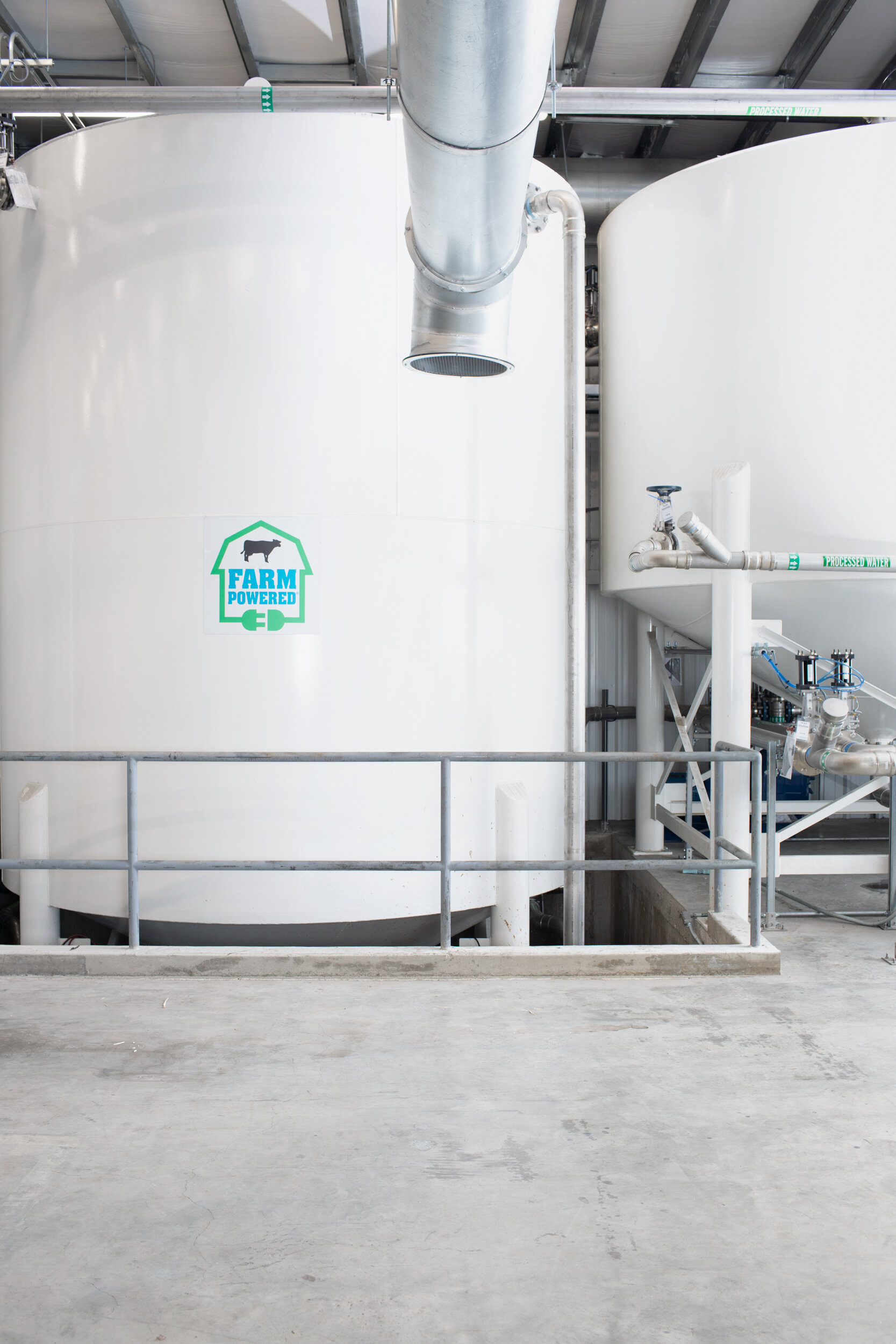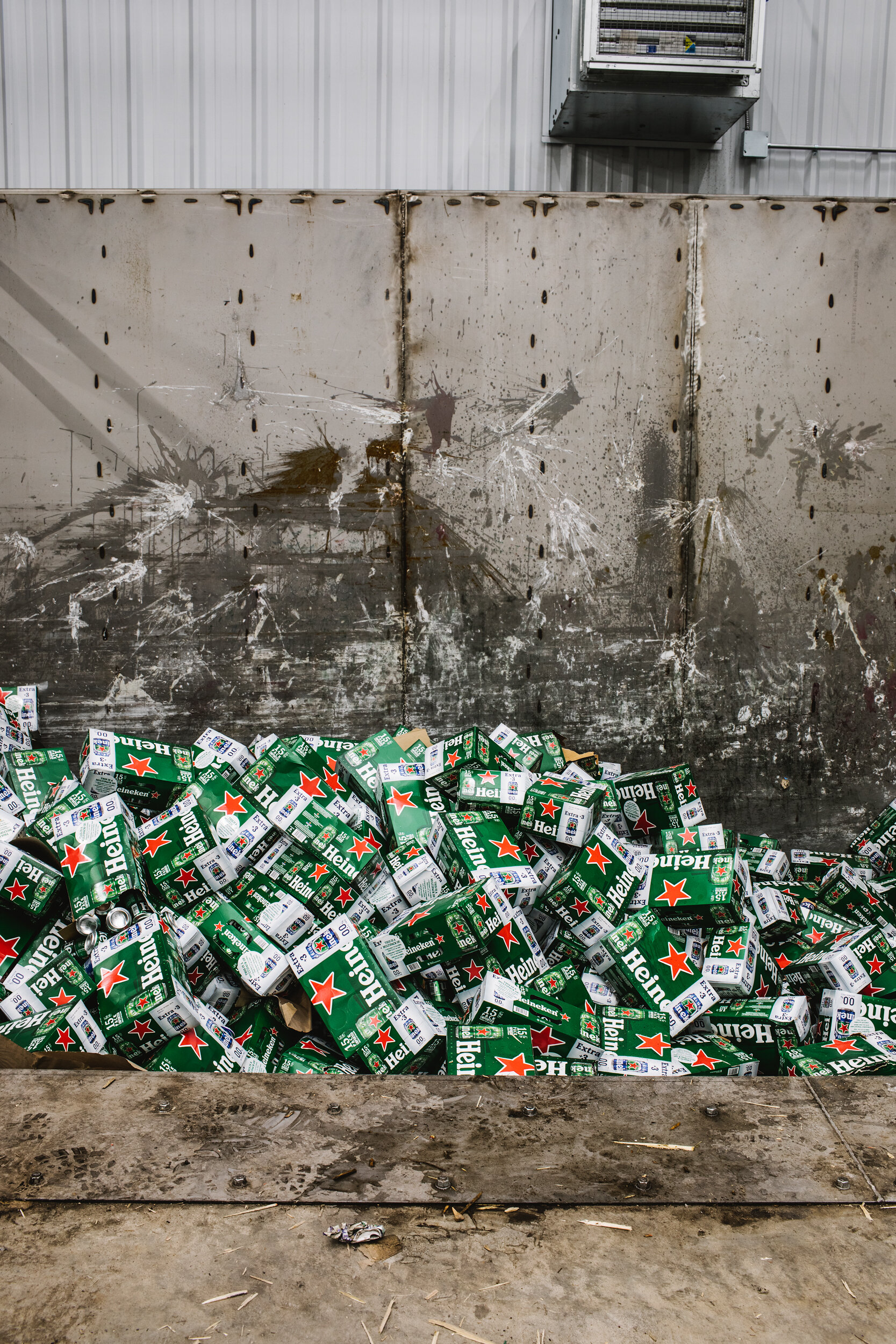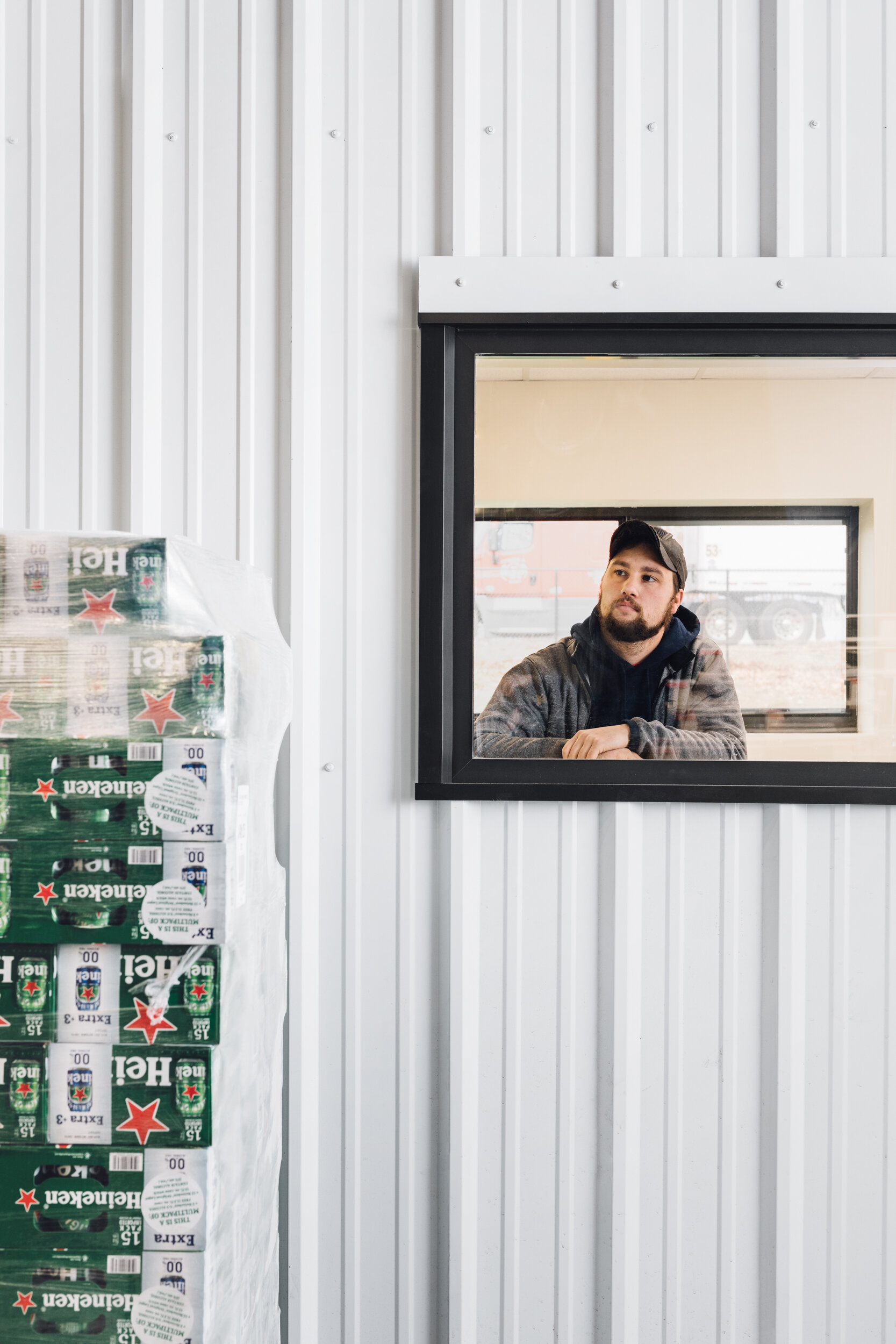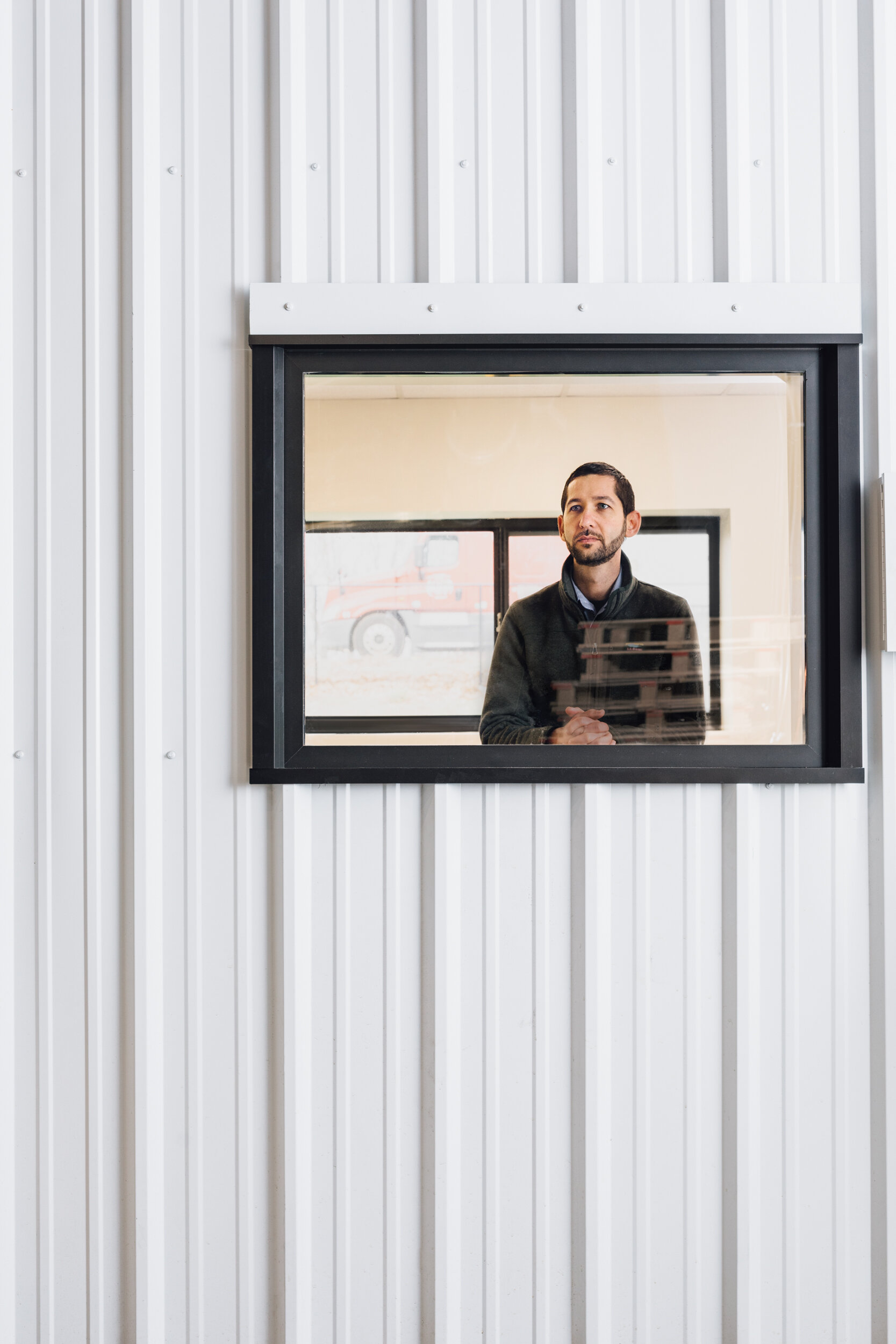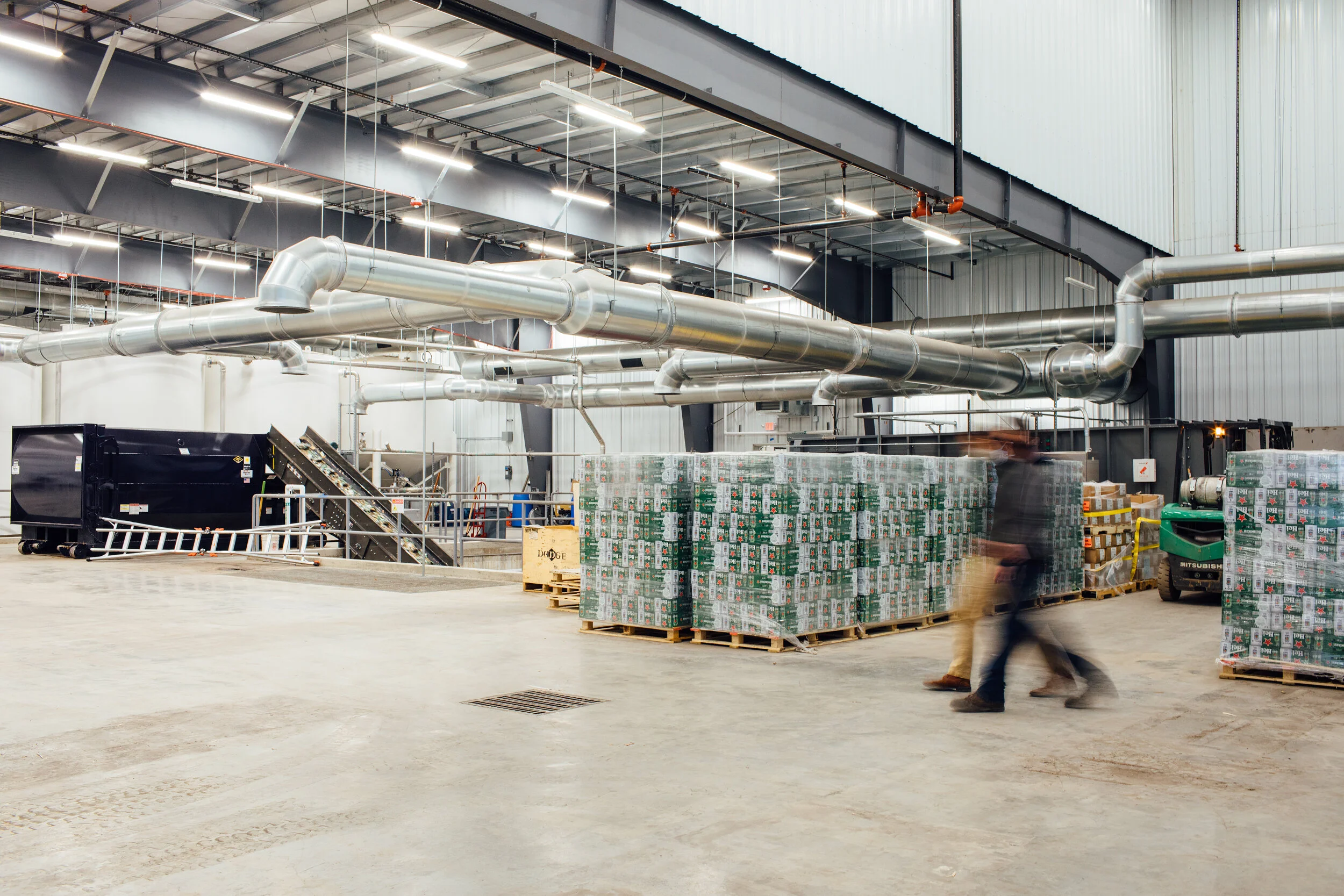Un-Packaging the Food Recycling Revolution
Photos by Adam DeTour
A NOTE: We first profiled Vanguard Renewables and their partnership with Jordan Dairy Farms in our Winter 2020 issue on climate, community and conservation. Because we— and our readers—are always hungry for good news on all three of those fronts, we decided to check back with Vanguard for an update.
Guinness and Nutella are the smell of success. At least that’s true if you are John Hanselman, co-founder and CEO of Vanguard Renewables, a Wellesley-based company that produces renewable energy from organic waste.
Vanguard’s six facilities, located on dairy farms across Massachusetts and in Vermont, convert a combination of food waste and manure from farms into natural gas using a process called anaerobic digestion. Food waste used in Vanguard facilities comes from a number of sources around New England: manufacturers such as Cabot and Gorton’s, grocery stores, colleges, restaurants.
But whatever the source, the one common denominator has always been that the food had to be in bulk form. It had to be able to be loaded into a Vanguard tanker truck and pumped into one of their massive digesters. That meant Vanguard could accept trimmings from a grocery store or butcher shop, but not packages of spoiled meat from those same stores. Those might well end up in the landfill.
Or at least they did before October 2020, when Vanguard opened its latest facility in Agawam, Massachusetts.
Known officially as the Organics Recycling Facility, the new 13,000-square-foot location allows Vanguard to begin accepting packaged food for use in its digesters—up to 250 tons of it a day. Hanselman knew there would be demand from food manufacturers to take care of products that are unsafe to sell because they are off specification, past their expiration date or have been unrefrigerated for too long.
He expected it to take a year or more to secure a constant stream of food waste for the new recycling facility, which Vanguard located near the interchange of the Massachusetts Turnpike and I-91 for easy access throughout the region. But food producers were more than eager to get started.
“We were just kind of running the equipment to see how it runs. But from the moment that we told people we were willing to take food waste, we’ve had a constant stream going into the system—much, much, much more than we expected,” Hanselman says.
It all started with Nutella and Guinness.
“The first day of operation was probably the best that the system will ever smell. We were still finishing up a lot of the work inside with lighting and things like that. These workmen see 300 cases of Guinness beer getting squished—I think there were tears in their eyes,” he says.
As Vanguard has been growing its facilities throughout NewEngland—it is the largest organics recycler in the Northeast— the company recognized that being able to expand into packaged food was an important next step for their business.
“I think this is the single most important thing we’ve done as a company. Now we have the ability to say to anybody, ‘We don’t care how your organic material is. We can take it, and we either send it directly to the farm if it’s clean, or we send it out to Agawam if it’s not.’ That takes the burden off of the consumer or the manufacturer to separate efficiently,” Hanselman says.
The Vanguard CEO notes that “zero sort” recycling, where everything goes into the same bin, has been the model for successful recycling programs in the U.S. “This allows us to do that for food waste. That, I think, is a real game changer.”
The technology that Vanguard uses to process packaged food was developed in Europe, where they have been recycling food waste for 20 years. The system can accept a truckload of packaged sausages, yogurt or sweetened iced tea and begin processing immediately. The equipment is able to accept plastic, paper and metal packaging—everything but glass. Even the wooden pallets used for shipping can be recycled or added to the organic mixture and converted into natural gas.
“We have multiple ways for us to separate the organic materials from packaging materials. We squish it and we blend it and we spin it. We do all sorts of things to it. It is very Willy Wonka,” Hanselman says.
Once a tractor-trailer or truck backs into the building’s loading dock (probably more correctly an “unloading” dock), its contents are placed on a 40-foot-long “walking floor” where the separation process begins. As planks in the floor shift back and forth, the crates or packages of food make their way from one side of the container to the other. Vanguard workers have about eight minutes to visually inspect the materials as they go by. They are looking for things like glass containers or large metal cylinders that cannot be sent through the rest of the process and must be separated out.
From there, the materials drop into the mouth of the recycler, where they are met with 18-foot augers that begin breaking apart cardboard boxes and plastic packages. The next step is a turbo separator that uses a spinning drum, hammers and centrifugal force to further separate food from the packaging. As Hanselman describes it, the process is designed to “squeeze” the contents out without shredding the packaging material.
“If you just put it through a shredder, it blows everything into little bits and pieces and it’s impossible to recover it.”
The goal is to recycle as much of the plastic, metal and cardboard packaging as possible while also separating out the organics. The materials are washed, and solid organics are separated from liquids with a mesh screen. “If we squish 20 crates of iced tea, we recycle the tea. Rather than using water, we use the tea as our liquid. That’s great for the environment, and it’s also great because we’re not diluting as much,” Hanselman says.
The organic materials are then sent to one of four onsite tanks where they are held before being sent to one of Vanguard’s digesters. Every day, Vanguard creates a blend of materials from the tanks and sends them off in trucks to begin being converted into natural gas. “We have high-, medium- and low-strength. It’s just like a gas station for food waste,” Hanselman says.
To keep the digesters running smoothly, it’s important that they are fed with a variety of types of organic materials. It turns out that a diet high in Nutella and beer isn’t any better for the microbes that produce methane than it is for people. “You fill them full of sugar and sweets, and they’re bouncing off the walls, then they crash. We don’t want that. Crashing bugs is a bad thing. We try to feed them as balanced a meal as possible. That’s part of what we’ve gotten really good at over the last seven years,” he says.
Vanguard began generating renewable energy with a single dairy farm in Rutland, Massachusetts, and has grown to include six locations. The newest is at Goodrich Farm in Salisbury, Vermont. It generates renewable natural gas, much of which travels by pipeline to the main power plant at Middlebury College. The college has agreed to purchase the bulk of output as part of its 10-year commitment to using all renewable energy to power its campus. Vanguard was recently licensed to do business in New York and will open its next facility in the Hudson River Valley.
Although growing, Vanguard, like many companies, saw its business change quickly during the COVID-19 pandemic. Pre-pandemic, about a third of Vanguard’s food waste came from restaurants and schools. That business slowed, but the company also began seeing changes in the materials they received from food producers. While Vanguard facilities often received wash milk, whey and other byproducts from dairy processing, they suddenly began receiving a great deal of raw milk as the pandemic took hold. It was a product that they had never seen in the past.
As restaurants were no longer buying butter packaged in bulk and schools were no longer in session to buy milk, dairy producers were stuck with extra product as they struggled to shift gears to meet the needs of people who were hunkered down at home.
“I thought, ‘This is terrible. We’re seeing unprocessed milk, but there are people who don’t have food in Massachusetts. There are people who have lost their jobs, and we’re dumping milk. Is there any way we can process this?’” Hanselman recalls.
In early May, Vanguard joined with Dairy Farmers of America, Massachusetts State Representative Shawn Dooley of Norfolk and H.P. Hood to find a way to begin processing the excess product as whole milk and distributing it to families for free. Hood processed the milk, and volunteers from Dairy Farmers of America, Vanguard and the National Guard helped distribute it.
The group’s first milk drive was at Boston College High School, where 8,600 gallons of milk were distributed to about 4,000 families who drove up to the pickup site. Although word had gotten out through the press and local food banks, Hanselman wasn’t sure what to expect.
“What was both unbelievably sad, but gratifying, was I’d say half the cars had kids in them. This was parents saying, ‘Hey, this is amazing nutrition for our kids. Thanks so much.’ It made you feel good. It was a scary time too, because it was really early days when we did the first one.”
The group went on to make similar distributions across the Commonwealth in Plainville, Springfield and Pittsfield, and also in Providence.
Hanselman says that the long, difficult pandemic has helped crystalize food manufacturers’ commitment to doing things the right way—whether by converting more waste into renewable energy or finding ways to ensure that food gets into the hands of people who need it.
“The food waste recycling revolution continues, I guess.”
This story appeared in the Winter 2021 issue.

